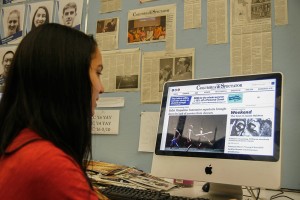
Media startups need more guidance than most new companies to survive the shifting digital landscape, said Sandy Khaund, director of Media Camp, a media startup accelerator that offers that aid.
Digital media startups often benefit from being part of a community that can help them leverage the unpredictable tech storm, according to Khaund. “You need a lot of ability to know when to adapt and when not to adapt,” he said.
Media Camp, a California-based organization crafted by Turner Broadcasting System, Inc. and Warner Bros. Entertainment, launched about three years ago. It provides budding media tech businesses with a community of fellow startup leaders and mentors to strategize company development and learn how to generate more funds.
To date, Media Camp has assisted 16 companies. Each startup receives $20,000 in funding and plenty of advice from experts. At a minimum, a startup founder attends a weekly workshop dinner with mentors like Khaund for three months.
“I empathize with [the CEOs] at the least and counsel them,” he said. “I don’t have a financial investment, but an emotional investment with them.”
Startup communities may be the most supportive and brutally honest gift to new CEOs. After all, harsh commentary is threaded into the nature of young business. It’s hard developing a startup without the input of special resources to help navigate rough waters.
No one wants to hear that their brainchild has problems staying afloat, but Khaund believes it crucial that entrepreneurs learn to take an honest dose of criticism.
“Fight like you’re right, but listen like you’re wrong,” Khaund said, noting that the “constructive confrontation” is especially important in selling a product in today’s unpredictable journalistic market. “What does the next wave of news look like? It’s the opportunity to [explore] the question and make sure the conversation is strong and the entrepreneur knows the feedback.”
Khaund, a founder of two startups himself, offers a personal cautionary tale to those in his digital media accelerator. Before working with Turner Media’s accelerator, he struggled firsthand with his own startup 15 years ago, mainly because he said didn’t have a strong business model and didn’t know the industry well. After years of wrestling with the company, Khaund had to jump ship. His second attempt a decade later, a mobile learning program called Irynsoft (a combination of his daughters’ names), gained footing with the help of an education group, Teach for America.
“We exchanged our respective domain expertise,” he explained. “We’re both trying to disrupt education, but we’re going at it from different angles. The community supporting a new company is crucial to its range of vision.”
Misha Leybovich, CEO and founder of Meograph, experienced that range of perspectives under Media Camp, and continues to reach out to the community after they parted ways with the program.
“With Media Camp, we got real answers. Always helpful, always frank,” Leybovich said. Meograph, a startup that joined Media Camp in 2013, embeds multimedia pieces into company websites. During the program, he’d workshop with the accelerator weekly over dinner, combing through the business’s strengths and challenges. “They’re very fair-minded. You need very thick skin.” He completed his work with Media Camp in September.
Other possible opportunities for startup founders include larger accelerators, such as California-based Y-Combinator, which supports a broader spectrum of markets. Aaron Harris, a Y Combinator partner, was inspired when he worked with Y Combinator in 2011 to boost his own educational organization, Tutorspree.
“On a basic level, it’s simply being part of a community of incredibly motivated people who are trying to achieve big things,” he said. “You wanted to share that, ‘Hey, we’re doing good things and we’re making progress.’”
The startup shut down, as many do, in 2013. Despite the risk of developing a young company, Harris said it surprised him to receive such emphatic of support outside of his young business.








Leave a Comment